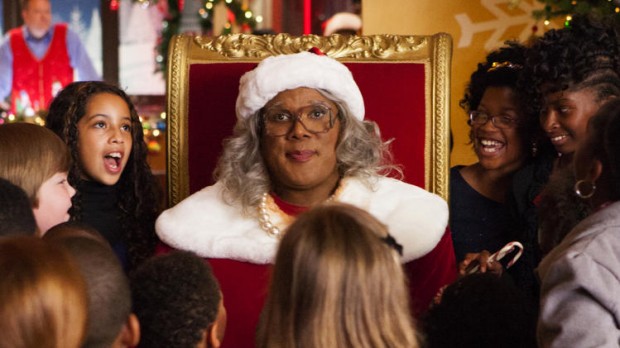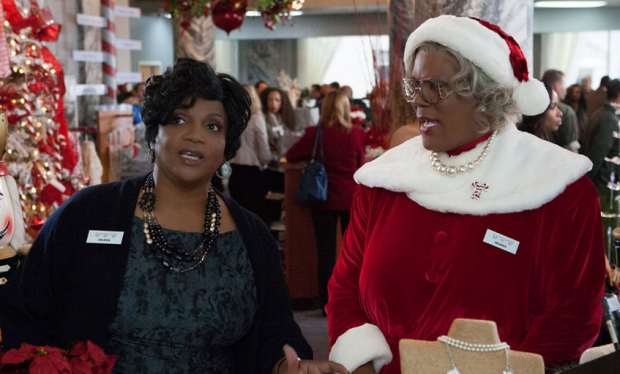Guess who’s coming to dinner? It’s Madea and Larry the Cable Guy. Tyler Perry’s A Madea Christmas is another fascinating trainwreck of a Tyler Perry film. Like filmmakers Joe Swanberg and Tommy Wiseau, Perry has set up his company in a way where he essentially has total freedom. This includes very little attention to production value, using a steadicam, two shots, and edited with very long takes that drain the energy out of the comedy; the film has the amateurish look of a sloppy 48 Hour Film Project team. It’s also full of curious editing choices, including clip art swipes that look bizarrely out of place, while the editing technique is borrowed from three-camera sitcoms — I honestly haven’t seen transitions like this since Tim Allen’s Home Improvement. With this said, let’s get right into the meat of thing.

Perry returns as Madea, a rude aunt who serves a type of proxy into what is a very thin and dry story. Thankfully, she’s here for us and like Kermit the Frog she finds herself in a new adventure every time. In Perry’s world anyone can show up and anything can happen, be it auto-tuned TV news star Antoine Dodson or the aforementioned Larry the Cable Guy. For much of the story’s first act Madea works in an upscale Atlanta department store with Eileen (Anna Maria Horsford), a woman who is concerned her daughter Lacey (Tika Sumpter) is going to miss Christmas.
Eileen and Madea barge right into Lacey’s life, where she’s been secretly living with her caucasian husband Conner (Eric Lively), a farm boy who did a stint at — and, I kid you not — “New York State University,” where he and Lacey met. This, of course, makes him a target for Tanner (Chad Michael Murray), who shows slight racist tendencies, but more or less just doesn’t like Conner ever since “they was kids.”
Madea won’t have any of this Lacey-lying-to-her-mama business, and that’s where the fun could potentially start, but it never truly does. Perry, borrowing from his stage play, doesn’t open it up for cinema where you can have an expressive close-up, for example. Perry’s filmmaking is lazy, manipulative, and a shame. Consider the power Madea has — sure, I can’t project everything onto Perry, but like South Park and the Saw movies, she returns frequently and can approach topical subjects that reflect the zeitgeist. The films’ core themes are racism, bullying, and eventually, the “War on Christmas,” but this leads to its own set of issues.

The problem is the treatment of racism breaks no new ground and represents the issues in the simplest most condescending form. At one point Madea walks into a Klan meeting. This could have been a fascinating moment, but instead, she turns and runs away. Perhaps this is indicative of just how lazy this movie is, although it’s not without laughs, including several cringe-inducing ones.
Perry remains one of the more intriguing American filmmakers, ripe for future hipsters and film scholars to rediscover in an inevitable retrospective at Film Forum in about 40 years from now. I have no doubt we will be talking about him, from his attempts at broad comedy to his Douglas Sirk-style melodramas like The Family that Preys, Good Deeds, and Why Did I Get Married Too. Unfortunately Tyler Perry’s A Madea Christmas is his laziest feature in a while.
Tyler Perry’s A Madea Christmas is now playing in wide release.

